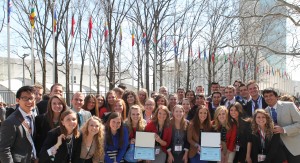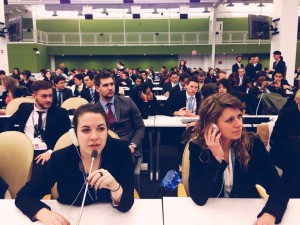Forty-five BYU students unveiled the process of international diplomacy at the Model United Nations in New York City in April. Split into two teams, they rallied around each other to win Outstanding Delegation awards for their representation of Iran and Gambia during the week-long conference.

“It’s a big deal,” said Cory Leonard, assistant director of the Kennedy Center. “I jokingly say we don’t make a big enough deal when the rugby team wins the national championship. Well this is the same thing; it’s just a little nerdier.”
This year’s students came from diverse majors, including biology, business strategy, English, political science and others. Before they could participate in the conference, they first attended two MUN preparation classes in the fall and winter. These classes prepared students who may have had no political knowledge to perform well.
Only the top 2 percent receive Outstanding Delegation awards, and BYU’s two delegations each received one. Leonard teaches the MUN preparation classes and grooms students’ negotiation, public speaking, parliamentary procedure, research and policy writing skills.
“The experience you get is to engage with students on global issues and to learn and develop those five skills,” Leonard said. “Those five skills are not only related to diplomacy; they relate to how to interact with people, how to negotiate, how to effectively convey ideas.”
Blythe Beercroft, an international relations major from North Potomac, Maryland, represented Germany at the MUN in 2010. After serving her mission at Temple Square, she returned to the class as head TA and served as head delegate at the conference. She has a lot of experience in this field but recognizes other benefits she received from the MUN.
“I thought this was really great preparation for a mission because it really helped my public speaking; it really helped me to approach people and interact with people,” Beercroft said.
Beercroft felt nervous her first time in New York despite the fact that she had participated in similar conferences throughout high school. She feels BYU’s program prepared her well, and everything clicked once she began putting things into practice. Beercroft is starting her master’s degree in global health this fall at Georgetown University.

Political science and international relations students have the advantage of knowing social science research, but the Kennedy Center invites all majors to participate, because they bring valuable skills to the table. Alex Chu, a biology major from Overland Park, Kansas, represented Iran’s stance on genetically modified organisms. His background in science allowed him to negotiate more effectively.
BYU has a reputation cooperative negotiation at the conference. Luiza Kulchetscki, an international relations major from Calgary, Canada, recognized this as an advantage.
“I was kind of surprised at how competitive it was once you got there,” Kulchetscki said. “One thing that I learned is that it really matters how you treat people a lot. I think we we’re successful … because we made it a point to be kind and inviting and welcoming to everyone around us.”
English is the official language of the MUN, though many students come from outside the country. A young woman from Germany ran to Kulchetscki on the verge of tears after agreeing to a decision she had misunderstood. Kultchetscki calmed her down, and together they spoke with the board of directors and managed to rectify the situation.
“I realized very quickly that we had to speak very concisely and sometimes slowly when we were talking to someone from another country,” Kulchetscki said. “But overall I was really impressed with the level of English that everybody came in with.”
Students role-play, acting the way their assigned country would act, but the competition is real. Some delegations will try to undercut others at the last minute, and they have to deal with it. BYU students get experience they wouldn’t normally get, dealing with difficult negotiators from other universities.
“It really gives you a chance to shine and to bring everything together in something you actually can put on a résumé and say, ‘I did this, and here’s what I learned, and here’s what I can offer you as an employee,'” Barbie DeSoto said.
DeSoto is a French studies graduate student from Temecula, California. Previously, she double majored in French and journalism, writing for two different newspapers after graduation, helping prepare her for the writing portion of the MUN, but she came out with a new skill, public speaking.
The only way students can participate in the conference twice while at BYU is by participating as a TA for the second go-around. The Kennedy Center limits participants to one year to allow the opportunity to as many interested students as possible.




